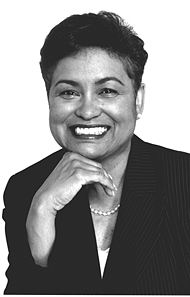

This is a serious story, but it is a story Charlotte Pierce-Baker wants told. Pierce-Baker, who has taught at the University of Pennsylvania, has written a book on rape survivors who are African-American women. In the process Pierce-Baker not only discovered a silent community but also dealt with her own silence.
A rape survivor herself, Baker found herself alone in 1981 after the assault. Although there were an abundance of rape-survivor support groups, they were dominated by white women.

"I couldn't find any other African-American women. Their voices weren't there," Pierce-Baker said. "Fourteen years later it became urgent what I had to do: I must find these women."
Pierce-Baker began searching for these women in the hopes that she could write an academic piece on race and rape. But as people began to come forward with their stories, the topic became more and more powerful, warranting what those close to her were suggesting: a book.
Surviving the Silence: Black Women's Stories of Rape was the result. In it, Pierce-Baker managed to write her own story and mesh it with the stories of those survivors she interviewed as well as provide her academic voice for interpretation.
Among these discoveries was a fascinating insight into the silence of black women. Pierce-Baker cited myths that are the heart of racist views today drive victims into silence - especially the myth that black men are rapists.
"These mythologies are concretified. Black people are constantly trying to not reinforce that mythology, so they don't tell on their perpetrators," Pierce-Baker said. In the book, Pierce-Baker focused on date-rape. White perpetrators consistently receive lighter sentences than African-American men convicted of rape. In an attempt to protect black men, black women shell up. "Black women are reluctant to say a black man raped them because he'll have all kinds of disciplinary actions placed on them," she said.
Even though these observations are an integral part of the book, Pierce-Baker said, "It's not a book where I talk about race. I let the book do the talking."
And that it does. Pierce-Baker said every woman she talked to brought up race. "Police didn't even believe them. They ended up treating it as a black-on-black crime," she said.
By the end of the book, Pierce-Baker felt the experience was indeed therapeutic. "I had to go back to places I thought I would never have to go again. As I wrote, things would come back to me that I thought I had forgotten."
After the book was written, Pierce-Baker received overwhelming support across gender and race. Just recently, she received a letter from a man in prison who had seen her book. "He wanted copies for the guys in prison so they could see that they were hurting women," she said.
"In the end I realized what I really wanted to do was form a community that didn't exist," she said. She hopes to be able to encourage all women to talk.
"Silence is so damaging. We need to put the shame on the outside," she said.
Pierce-Baker will speak on campus Tuesday in the Root Room of Carnegie. There will be a question and answer session and a formal talk.
Pierce-Baker's visit is being sponsored by the Flora Hewlett Foundation.
Pierce-Baker (photo courtesy of President's office)
Copyright © 1999, The Oberlin Review.
Volume 127, Number 16, March 5, 1999
Contact us with your comments and suggestions.